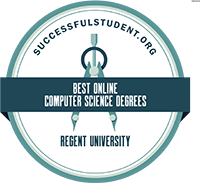
B.S. in Computer Science
Pursue a Successful Career With a Computer Science Degree
Ready to take your computer skills to the next level? Regent’s Bachelor of Science in Computer Science is a highly marketable degree that you can utilize in a variety of in-demand career fields. Learn to solve sophisticated computational problems, improve processing efficiencies, and explore ethical and social challenges connected to careers in tech and computer science—all from a Christian worldview.
DEVELOP YOUR SKILLS THROUGH A BACHELOR’S IN COMPUTER SCIENCE
Gain expert technology and programming knowledge as you acquire key industry certifications.
BUILD ON A STRONG FOUNDATION
Anchor your knowledge and skill on Christian principles and values.
LEARN FROM THE BEST
Be mentored by faculty in Virginia Beach who hold the highest degrees in their field.
ALIGN YOURSELF WITH EXCELLENCE
Regent has been ranked among Top National Universities by the U.S. News & World Report for two consecutive years (2019 and 2020). Our programs have been ranked by it as the #1 Best Online Bachelor’s Programs in Virginia for 8 years in a row. Experience the Regent difference through our Bachelor of Science in Computer Science degree, online or at our beautiful campus in Virginia Beach.

On completing the Bachelor of Science in Computer Science degree, online or on campus, you will be able to:
- Analyze, design and develop computing systems and networking infrastructures
- Understand programming languages, database management, operating systems and computational processes
- Apply logic and mathematics to verify correct, complete and secure solutions
Career Opportunities:
- Software Development & Engineering
- Video Game Programming & Digital Arts
- Systems Analysis & Engineering
- Computer Information Security
- Networks Administration
- Database & Data Mining Analyst
- Web Development
Terms and concepts in Computer Science. Topics include a review of algorithms, elementary data structures, program design, and programming utilizing a block structured programming language.
Fundamental concepts and techniques in computational design and relevant mathematics, including logic circuit design, modern processor architecture, and assembly language. Preparation for professional certification exam. Prerequisite: CSCI 201.
Design and implementation of modern Operating Systems, including Operating System components and structures, process and thread models, mutual exclusion and synchronization, scheduling algorithms, memory management, I/O controls, file systems, and security. Prerequisite: CSCI 201.
Issues relating to Computer Information Systems and the ethical and moral responsibilities of those who work with computers, professionals or end users. Provides foundation to make appropriate decisions when facing difficult situations.
Programming with the C++ language; object-oriented programming; classes, objects, inheritance, morphism; pointers, memory management; software development. Prerequisite: CSCI 201.
Studies the design of structures for representing and deploying information. Considers abstract structures and implementation techniques in specific programming languages. Prerequisites: CSCI 314.
Study of tools and techniques of database analysis and design. Attention to data modeling, designing relational databases, and normalization using modern database applications. Preparation for professional certification exam, such as Oracle Database SQL Expert certification or similar. Prerequisites: CSCI 314.
Trends in large scale computing platforms ranging from desktop multicore processors to virtualized cloud computing environments. Topics include parallel architectures and network topologies, granularity, applications, and debugging. Prerequisites: CSCI 210 and CSCI 314.
Mechanisms for mobile computing systems. Fundamental concepts of mobile and smart computing as well as service and security management of these systems. Preparation for professional certification exam. Prerequisites: CSCI 314.
Introduces programming fundamentals using Visual Basic.net. Use of algorithms and computer logic to translate data into information through structured design, coding, testing, and program debugging, writing programs in high-level, object-oriented language.
Students gain in-depth knowledge of networking and telecommunications fundamentals including LANs, MANs, WANs, intranets, the Internet, and the WWW. Attention to data communication and telecommunication concepts, models, standards, and protocols in the context of installation, configuration, systems integration, and management of infrastructure technologies. Prerequisite: ISYS 204 and Sophomore standing.
Business and government are facing a rapidly expanding need for information assurance professionals. Information protection program design, internetworking and application security, the development of information security safeguards and information security auditing, disaster recovery, policy development, identity management, and effective threat assessment. Prerequisite: ISYS 204 and Sophomore standing.
A first course in calculus and analytic geometry. Limits and continuity. Differentiation and applications of derivatives. Integration and the Fundamental Theorem of Calculus. Prerequisite: Grade of B- or better in MATH 164 or equivalent, or permission of department chair.
A second course in calculus and analytic geometry. Techniques and applications of integration. Introduction to differential equations. Parametric equations and polar coordinates. Infinite series and power series. Prerequisite: MATH 211.
A third course in calculus and analytic geometry. Vectors, lines and planes. Three-dimensional space and calculus of several variables, including partial differentiation and multiple integrals. Introduction to vector analysis. Prerequisite: MATH 212.
Systems of linear equations, linear transformations, and matrices, determinants, eigenvectors and eigenvalues. Euclidean spaces, vector spaces, and inner product spaces. Prerequisite: MATH 213.
Admission requirements vary based on the stage you’re at in life. Select a link below to learn how to apply.
2019-20 Tuition Rates
| Program Type | Tuition |
|---|---|
On-Campus Student
|
|
Online Student (enrolled in 8-week classes)
|
|
RN to B.S. in Nursing Tuition |
|
Student Fees
Fee | Amount | Description |
Application Fee (On-Campus & Evening/Online Students)
| $50 | One-time fee, nonrefundable |
Enrollment Deposit (On-Campus Students) Enrollment Deposit (Evening/Online Students) | $150
| Fee is deducted from tuition costs |
Graduation Fee(On-Campus & Evening/Online Students) | $60 | One-time fee upon submission of graduation application |
University Services Fee(On-Campus Students) | $700/semester | Contributes to university academic and administrative operations |
Optional Fees
Late Payment | $100/Session | Incurred per session in the event of late tuition payment |
Course Fees | Varies, | Some courses in theater, animation, cinema television or science labs carry an additional fee |
2020-21 Tuition Rates
| Program Type | Tuition |
|---|---|
On-Campus Student
|
|
Online Student (enrolled in 8-week classes)
|
|
RN to B.S. in Nursing Tuition |
|
Student Fees
Fee | Amount | Description |
Application Fee (On-Campus & Evening/Online Students)
| $50 | One-time fee, nonrefundable |
Enrollment Deposit (On-Campus Students) Enrollment Deposit (Evening/Online Students) | $150
| Fee is deducted from tuition costs |
Graduation Fee(On-Campus & Evening/Online Students) | $60 | One-time fee upon submission of graduation application |
University Services Fee(On-Campus Students) | $750/semester | Contributes to university academic and administrative operations |
Optional Fees
Late Payment | $100/Session | Incurred per session in the event of late tuition payment |
Course Fees | Varies, | Some courses in theater, animation, cinema television or science labs carry an additional fee |

